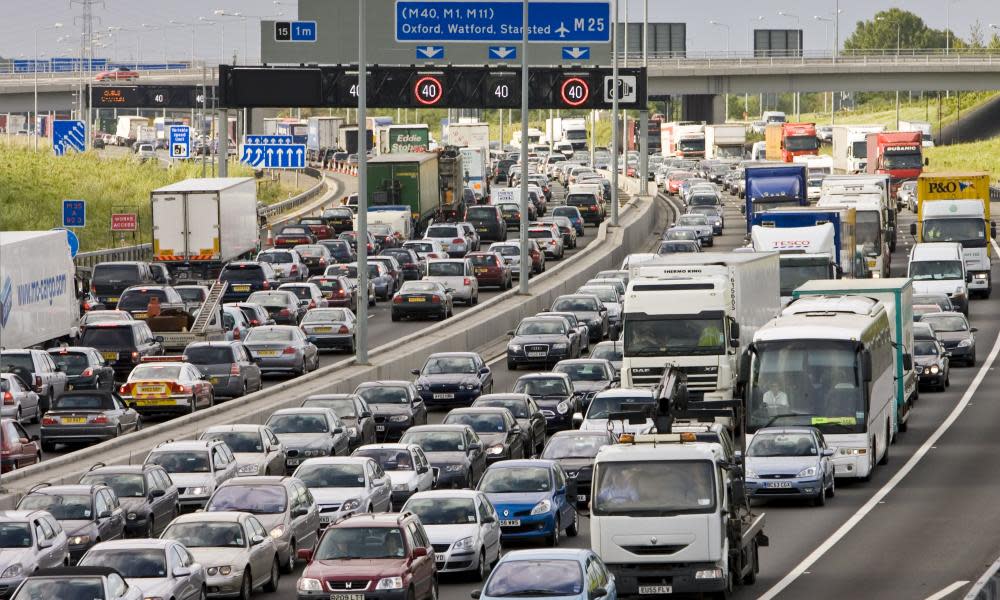The Guardian view on air pollution proposals: too little, much too late | Editorial

Only 20 years ago, it would have sounded like the stuff of fantasy: a clean, green image of the 21st century, with Britons gliding along in electrified, no doubt self-driving, cars. Even now, the pledge to ban the sale of petrol and diesel cars and vans from 2040 has a bold, vaguely futuristic ring to it. That is its political genius. In fact, it reflects the current trajectory of the motor industry – while masterfully distracting us from the government’s persistent failure in the rest of its plan to address the health crisis that must be tackled now: the air pollution that chokes our cities.
The announcement may help to concentrate the minds of policymakers, consumers and car manufacturers on the need to press ahead with the switch and the huge changes that will be required. (Installing ranks of charging points is the least of it; how will Britain supply them all with power?) But the government has already said that 2050 emissions targets will require “almost all new cars and vans sold to be near-zero emission at the tailpipe by 2040”. Norway is to ban the sale of all fossil-fuel-dependent cars by 2025. Momentum in electric purchases is building rapidly, thanks to falling costs, longer battery ranges and more charging points, even if the total number of sales remains relatively low; at present just 1 in 700 of the cars on Britain’s roads are pure electric. Volvo has said it will make only hybrid or fully electric cars from 2019. If anything, the need is for governments to offer short-term incentives so more people start choosing electric or hybrid vehicles now. Twenty-three years is too long to wait.
Tens of thousands of people die prematurely each year because of air pollution, and many more experience related health problems. But the government has dragged its feet throughout. First, it failed to meet the legally binding European targets on nitrogen dioxide emissions. Then, it twice failed to produce an adequate plan to address these. Next, it claimed that it could not publish its updated plan because it would breach “purdah” during the election campaign (an assertion the high court rightly rubbished).
Now it publishes these wholly inadequate and downright cynical proposals. It has admitted that introducing charges for vehicles to enter clean air zones would be the quickest and most cost-effective way of lowering nitrogen dioxide levels on most urban roads to acceptable rates. But its plan tries to dodge a backlash from motorists by putting the burden of such measures on local authorities – and urging that charges be used only as a last resort.
There are some good elements within this plan. Money to retrofit buses, HGVs and black cabs, and a bigger tranche to promote walking and cycling, will be money well spent – though the funding had been announced already. Extra cash to help councils curb diesel emissions is welcome, albeit insufficient at £255m. But at this rate any progress will be made at the pace of a Sinclair C5 rather than a top-of-the-range Tesla.
Last week, Michael Gove offered his vision of a green Brexit: “We have an opportunity, outside the EU, to design potentially more effective, more rigorous and more responsive institutions, new means of holding individuals and organisations to account for environmental outcomes,” the environment secretary insisted. But the late, inadequate and lamentable response to air pollution shows that this is about as likely to materialise as the £350m a week promised to the NHS on the side of a (conventionally fuelled) bus. The government has had to be forced into taking action, and it is taking the bare minimum it can. Imagine what it will do without EU scrutiny.
There is no need to design alternatives to the government’s plan in this case. Campaigners have put them forward already. Clean air zones may not sound as flashy or exciting as the distant vision Mr Gove has expertly promoted, but they would mean purer air and healthier residents – not in 23 years’ time, but now.

 Yahoo News
Yahoo News 
